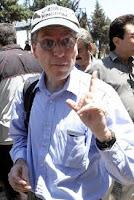The PAO (Public Affairs Officer) is the senior American with public diplomacy responsibilities on an embassy's Country Team. She or he is the person who awakens each morning wanting to know what the people are thinking. Absent a PAO, no one is effectively looking out for our strategic communication goals.
 |
| Amb. Robert Ford |
That, I believe, is the problem with our current Syria policy. We closed our Embassy in Damascus on February 6, 2012. Since that date, not only has the State Department had no eyes and ears on the ground, but there has been no PAO listening to the Syrian voices, assessing public attitudes, and arguing for steps to achieve our communication goals.
Walter Pincus seems to think that the Syrian public will have noticed some U.S. military exercises conducted in the vicinity. He believe they will deduce that we firmly support the cause of the rebels. Writing in the Washington Post yesterday, Pincus argues that air-land-sea Exercise Eager Lion 2012 held in Jordan and some other over-the-horizon military concentrations "make Syria’s Bashar al-Assad and Iran’s Ayatollah Ali Khamenei fully aware" of our position.
Leave aside the fact that Pincus' column reads like a State Department sheet of talking points meant to rebut the idea that we're "leading from behind" or not leading at all.
 |
| U.S. Embassy Damascus |
To be very clear, we don't need American boots on the ground. But, for public diplomacy's sake, we do need to provide tangible, visible support to the free-Syrian movement.
Georgetown University's Robert Lieber argues here that we have "waited far too long to take a more active role on Syria. While the fighting rages on, the U.S. has largely been on the sidelines, not even “leading from behind” as it eventually did in Libya 17 months ago." The Washington Post, NBC's Richard Engel and other news media have reported that the Syrian people (and others in the region) are fast losing faith in America's commitment to freedom. "The have... watched the United Nations send observers without authority, and the United States make what seem to many appear to be toothless condemnations," Engel reports.
If the Marshall Plan was a wonderful example of public diplomacy, what will future generations say of our Syria plan?
 |
| Lowering the flag, February 6, 2012 |

No comments:
Post a Comment